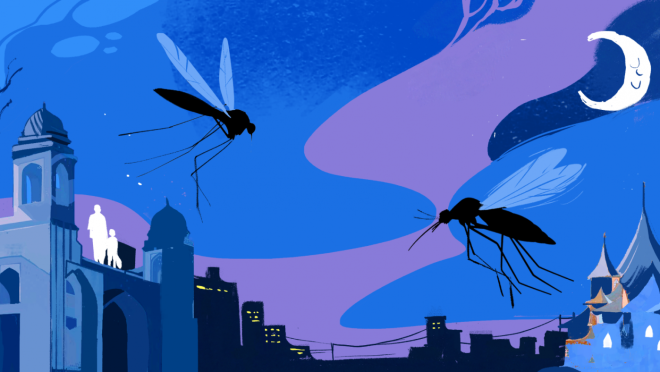The humming season
The humming season

Not loud, not threatening, but just a faint, persistent vibration in the air. It was like the tremble of high-voltage wires or the faraway buzz of a fluorescent bulb. People in Dhaka dismissed it at first. The city was always noisy; what was one more sound amid the chaos of horns, prayers, and generators?
But the hum didn’t stop.
By the third week of October, doctors began reporting strange fevers. People were coming in with shivering, disoriented speech, and a soft rash behind their ears.
One hospital in Mirpur noticed every patient carried the same mosquito bite pattern: four punctures, not one. The infection spread fast, but the Ministry called it a “seasonal viral fever.” No one noticed how quickly the morgues filled.
Then, on the night of 25 October 2025, the news broke.
One of the central news broadcasting studios glowed blue in the dark. The anchor, Sharmin Nahar, stared into the camera, her lipstick slightly shimmering in the light.
A strange sweat glistened beneath her eyes. Behind her, the red banner flashed:
“3 DEAD BODIES, INCLUDING A WOMAN’S, RECOVERED FROM DHAKA STREETS.”
Her voice trembled. “Authorities suspect the deaths may be linked to a newly identified…” She stopped mid-sentence.
A mosquito landed on the camera operator’s cheek. He brushed it off – then froze, staring at his hand. Blood.
Sharmin blinked. Something dark was moving near the ceiling vent. The hum grew louder. The crew turned in unison, eyes wide, the air vibrating with an invisible pulse.
Then the lights burst.
The live feed broadcast chaos. Waving shadows, wings flapping, a scream cut short. Viewers across Bangladesh sat in frozen silence as the screen went black.
By dawn, Dhaka was awake… and dying.
Hospitals were overflowing. Patients shuddered on the floors, muttering through cracked lips. When the doctors tried to restrain them, they opened their eyes – milky white, pupils gone. Some of them stood back up after flatlining, stumbling toward the sound of the hum.
No one knew where it came from. The power lines? The air? The blood?
Government alerts flooded phones: “STAY INDOORS. CLOSE WINDOWS. USE MOSQUITO NETS.” But by then, the mosquitoes were already inside.
In Dhanmondi, Reza Karim, a 34-year-old merchandiser, held his six-year-old daughter Lamia close. He had sealed every window with duct tape and stuffed the keyholes with tissue. The smell of burning coil filled the room, thick and bitter.
“Baba,” she whispered, “the sound’s inside my head.”
He held her close. “It’s just the wind, Lamia. Go to sleep.”
But he knew she was right. The hum wasn’t outside anymore. It was in him, too. Deep behind his eardrums, vibrating like an echo he couldn’t stop hearing.
At midnight, he looked out through the curtains. The streets were on fire. Shadows moved between the flames; not running, not human anymore. Their heads twitched rhythmically to the sound, their mouths opening and closing as if singing in silence.
Reza packed a small bag. He’d heard rumours of an army camp beyond Gabtoli Bridge. He lifted Lamia in his arms. “Hold on to me, baba. We’re going home.”
They moved through the dead city like ghosts.
The smell of rot clung to everything. Fruit stalls, rickshaws, the air itself. The mosquitoes were everywhere, clouding around lampposts, feeding on silence.
A woman stood barefoot in the middle of the road, her eyes dull, her mouth whispering something that sounded like… hmmmmm.
Reza tightened his grip on Lamiya and turned away.
Near Farmgate, he saw a bus crushed against a concrete divider. Inside, the passengers sat upright, motionless. Their skin was pale, their eyes still open. He walked past, afraid to breathe.
Then the hum deepened.
He felt it in his teeth. His bones. His heartbeat synced to its rhythm.
Lamia stirred on his shoulder. “Baba,” she murmured, “they’re calling me.”
He froze. “Who?”
“The ones with wings.”
A shiver crawled up his spine. He started running.
By the time he reached the bridge, dawn was breaking. The river below boiled with debris – wood, plastic, and bodies. On the far end, he saw soldiers waving, shouting.
He screamed, “HELP! PLEASE! MY DAUGHTER…”
The hum drowned him out.
From behind came a black cloud, twisting like smoke. The Swarm. Millions of mosquitoes filled the air, blotting out the sun. He wrapped Lamia in his shirt. Covering her face, he was moving with every ounce of breath he had left.
But it was useless.
The swarm caught them. The air turned solid with wings. They landed on his arms, his eyes, his mouth. He couldn’t scream. Thousands of tiny needles pierced him at once. The world dimmed, but through the haze, he saw Lamia’s calm but almost serene face.
Her lips moved.
“They said it’s time.”
Reza reached for her, but she was already standing. Her eyes were white, her mouth humming. The sound wasn’t just in the air anymore. It was coming from her.
By morning, the soldiers found the bridge empty.
No bodies. No blood. Only a strange residue, black and wet, clinging to the railings like tar.
They sealed the area, but the hum didn’t stop. It travelled through the power lines, through the air, through the pulse of the earth.
By noon, the emergency broadcast crackled back to life–
“Three more bodies recovered from Dhaka streets, including a child’s. Authorities warn citizens to remain indoors until further notice…”
The voice paused.
And in the static, for just a second, the hum rose again. Faint, rhythmic and alive.
Then, silence.
The story was awarded first place in the ‘Haunted Words’ competition, organised by TBS Graduates.


